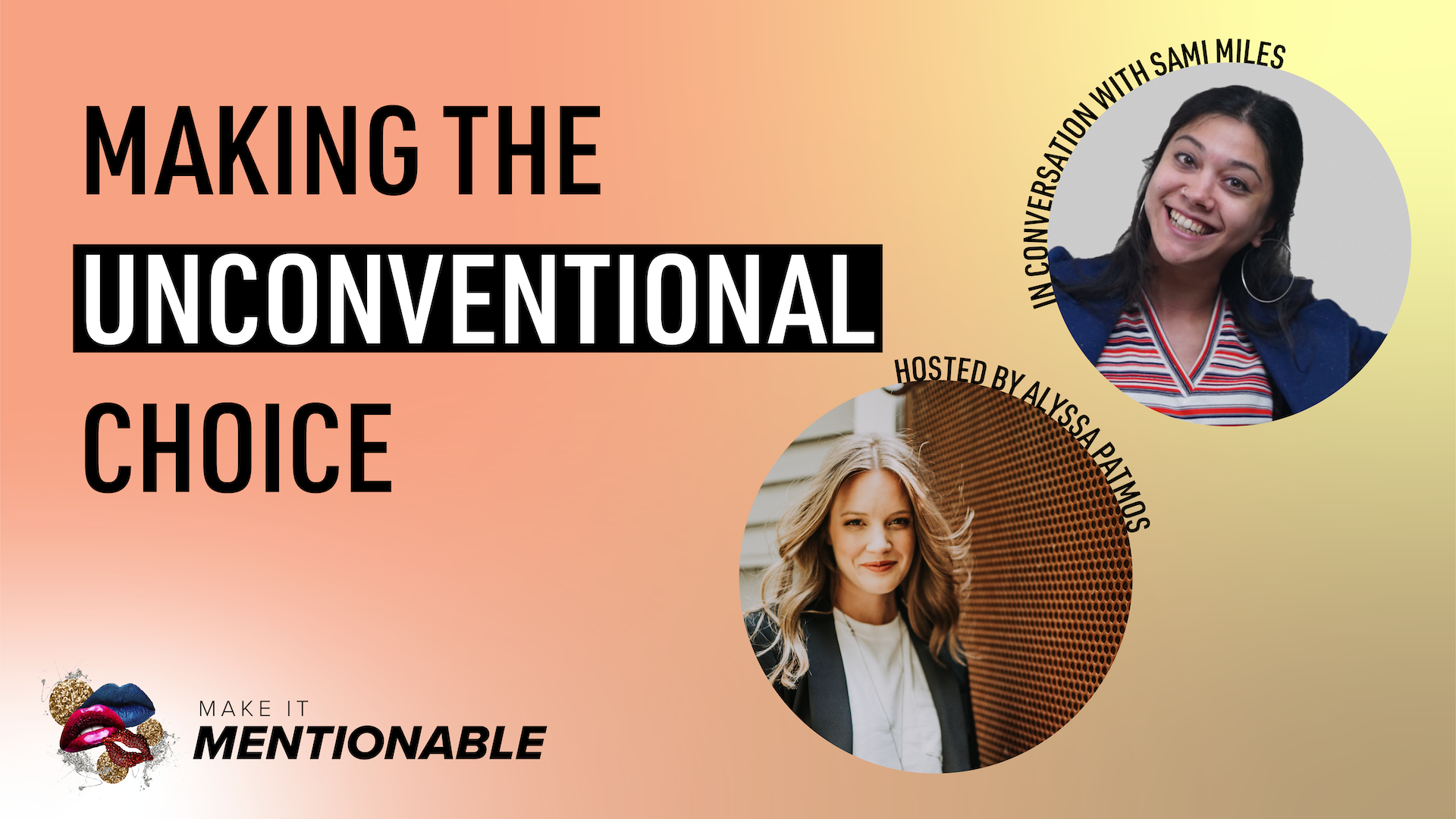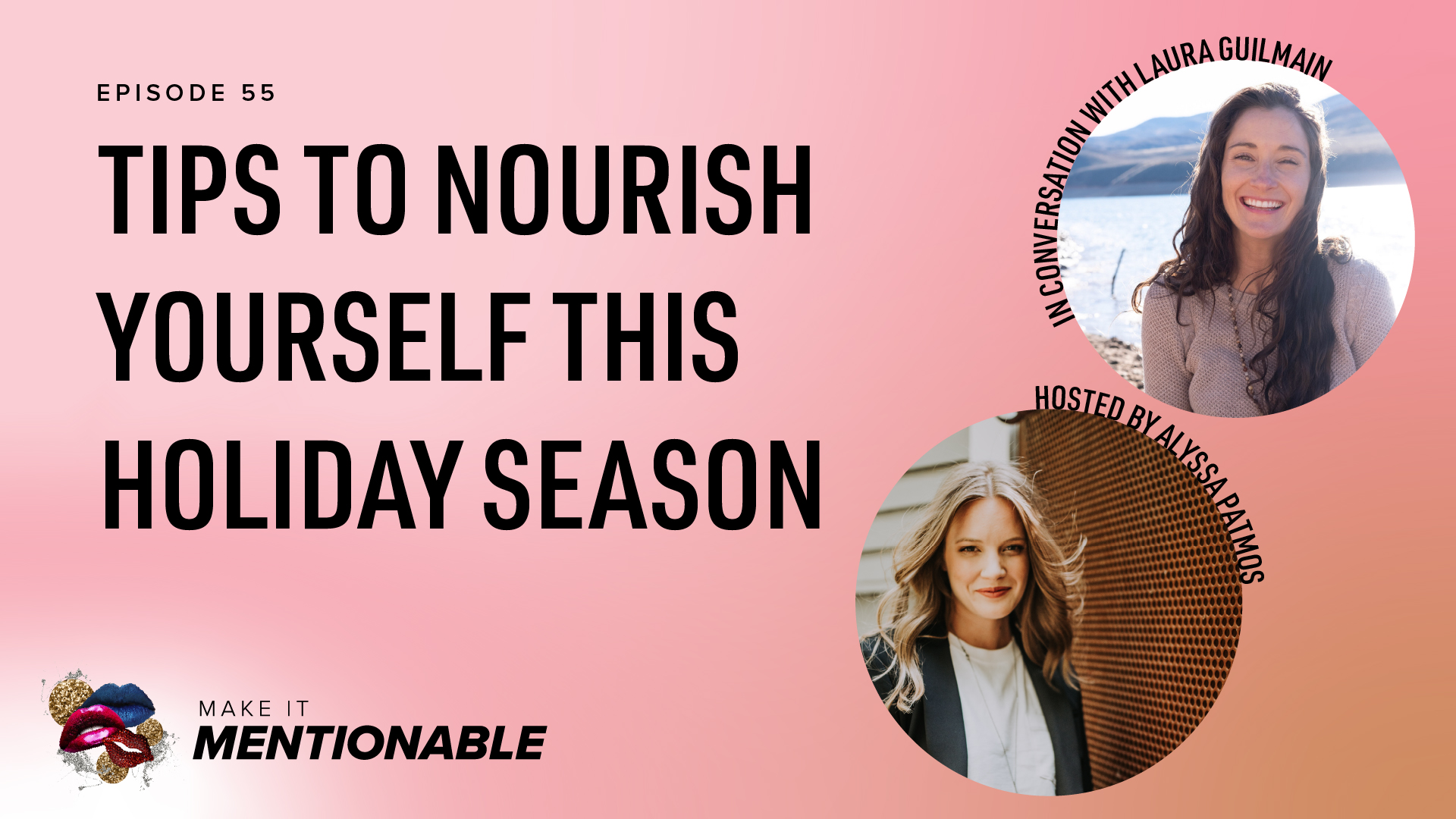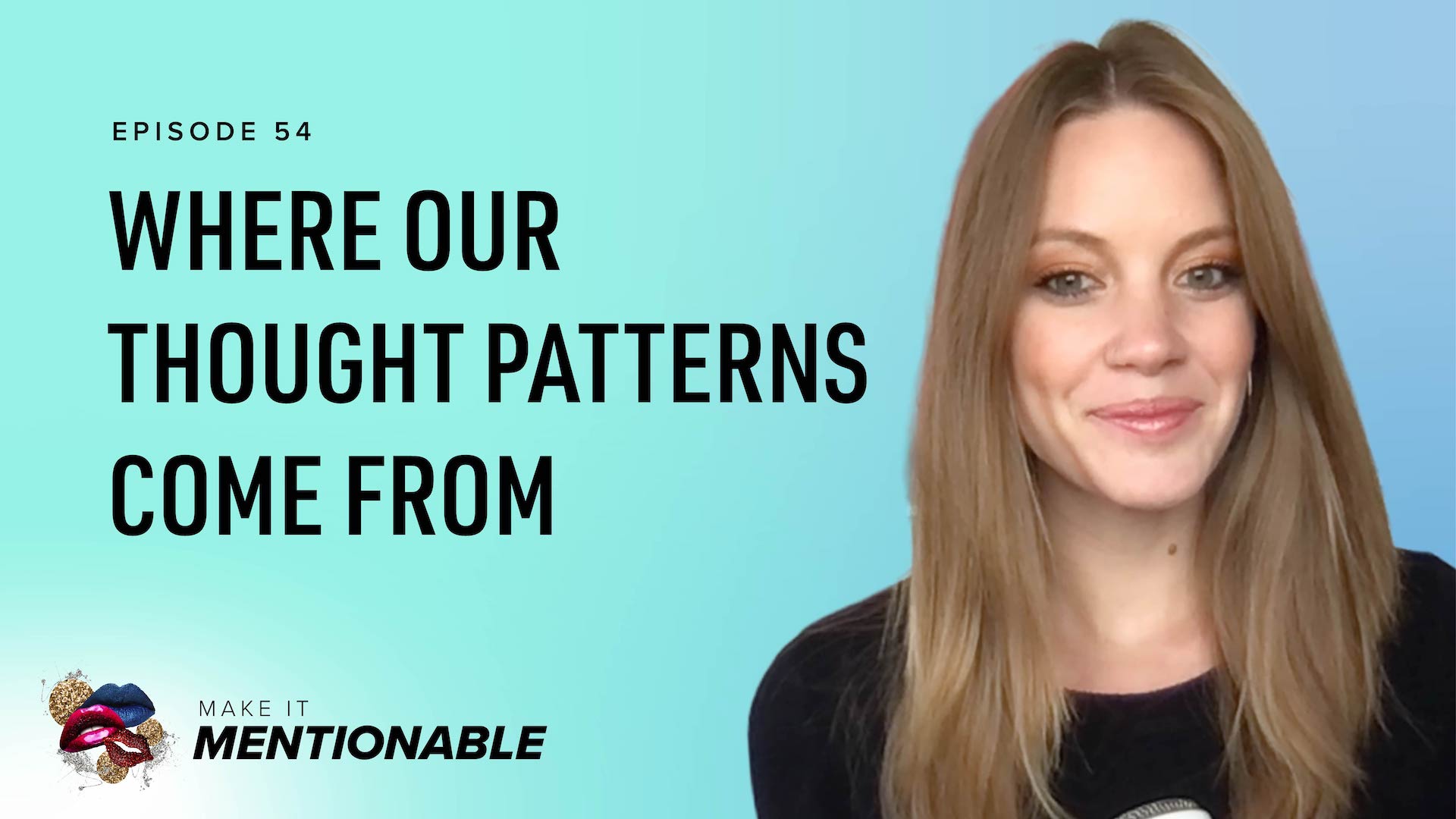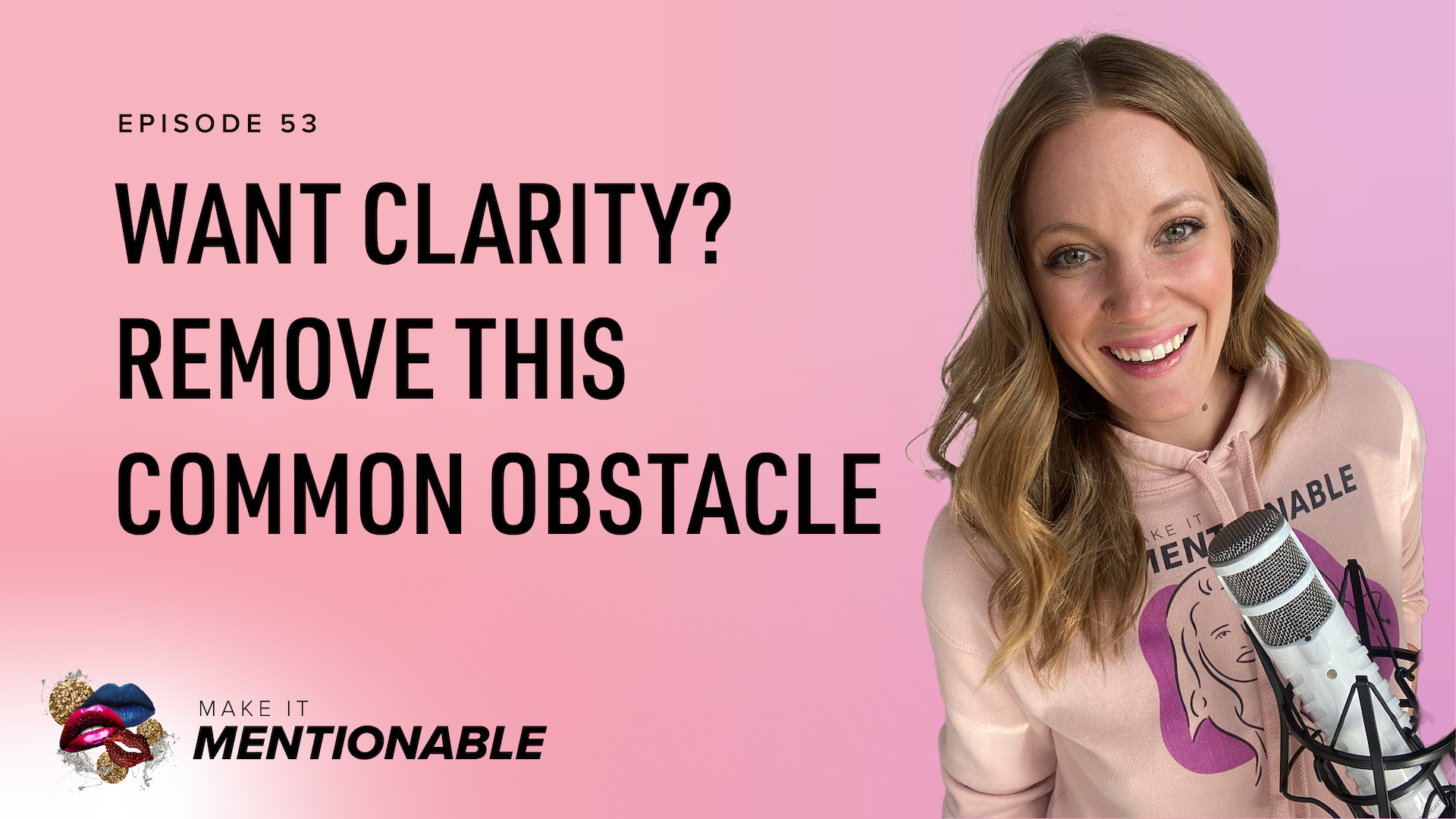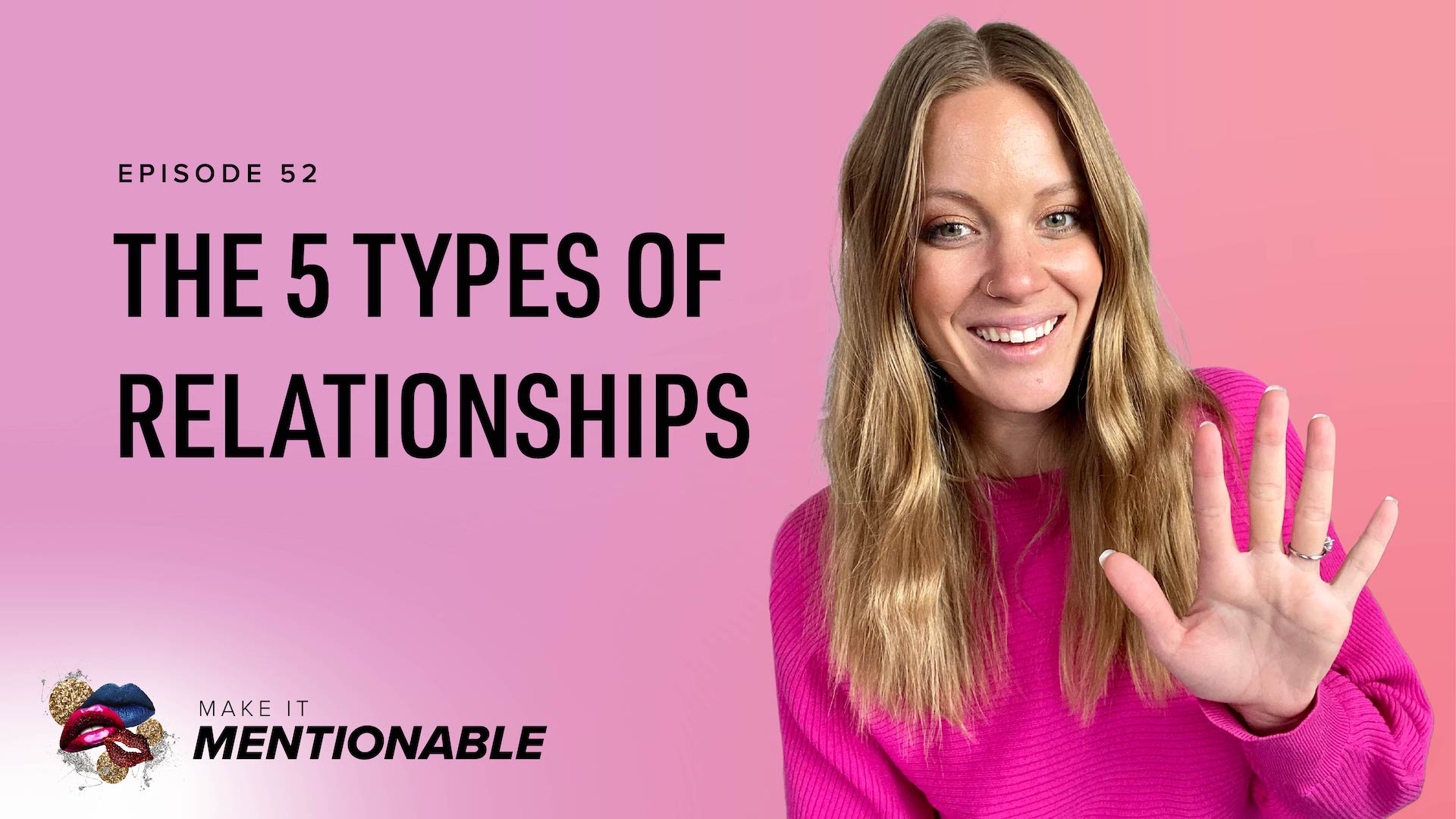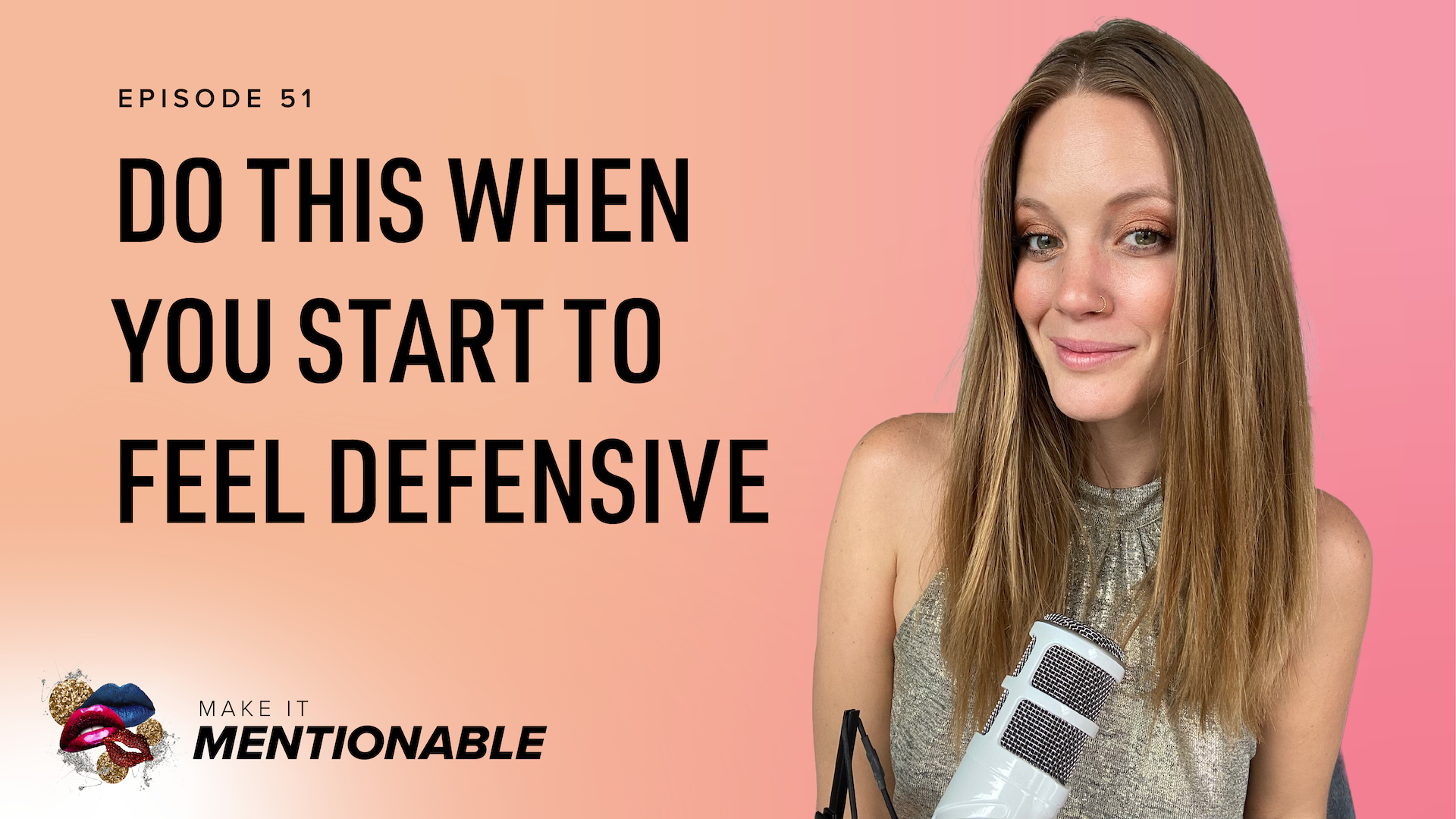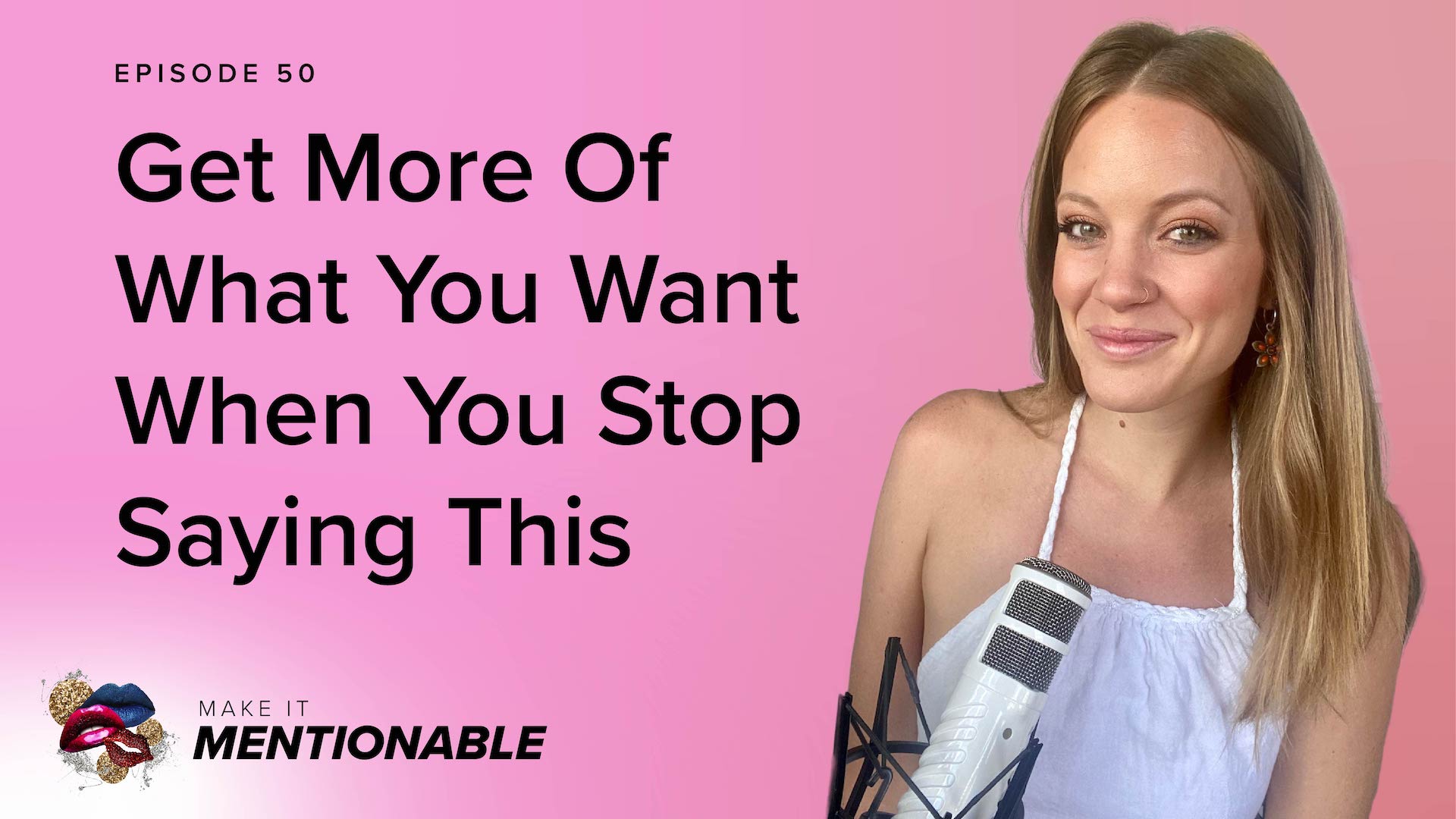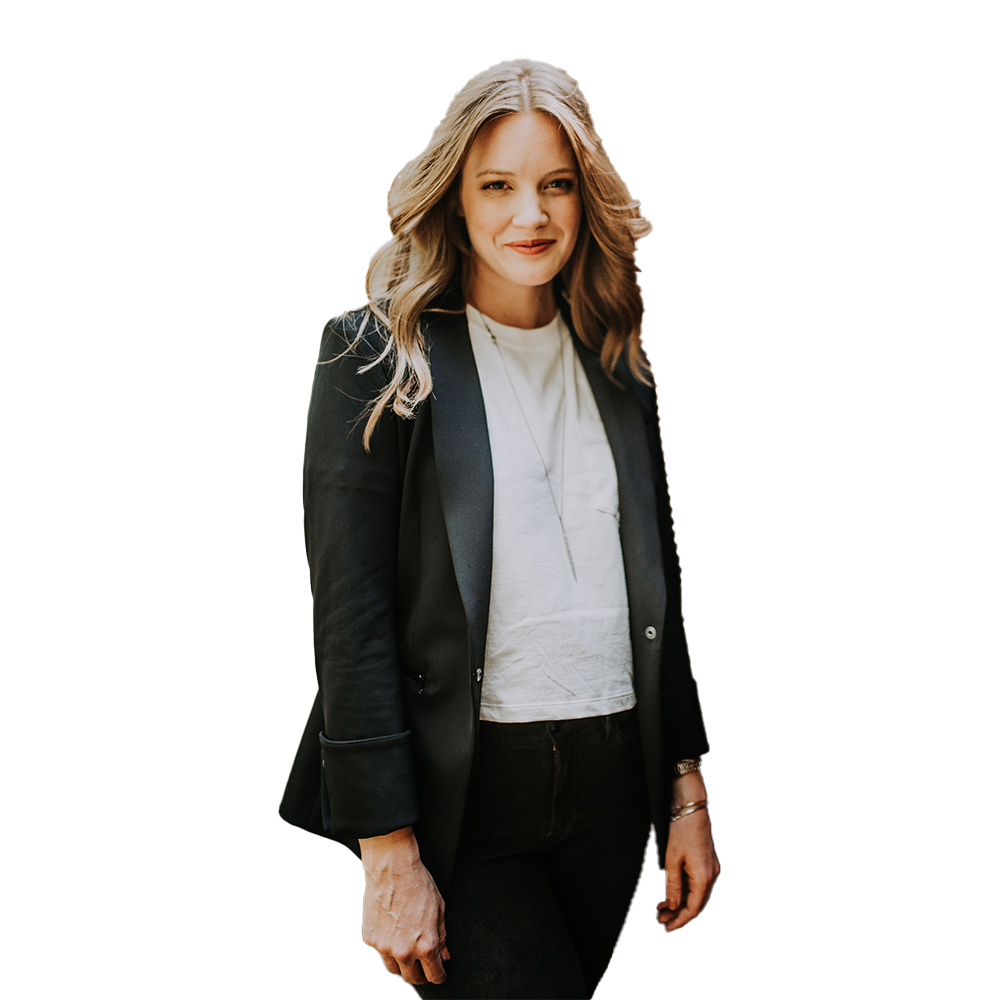Alyssa Patmos 0:04
This is Make It Mentionable. I’m Alyssa Patmos and this is the show about being human in a world that encourages us to be robots. I invite you to join me as we journey through the mess, the magic and the mania in between. Because what we can talk about, we can manage. This honest conversation extravaganza includes free flowing conversations and high doses of vulnerability to remind you that you aren’t alone. No topic is off limits, and episodes are designed to leave you smarter, aka more self aware than when you came. I am so glad you’re here.
Welcome back to another episode of Megan mentionable. I’m Alyssa. And today I am here with Sami Miles. And we’re talking about choice. And we’re gonna see where this goes. But you, Sami, have made some interesting choices recently, that I feel like a lot of people end up struggling with where it’s like, do I want to stay in the corporate world? Do I want to go out on my own? How do I handle kids and, and life as I’m making this choice? And so I think you have a rich perspective to share on on some of these topics. And thank you for being here today.
Sami Miles 1:28
Yeah, thanks so much for having me.
Alyssa Patmos 1:31
So before we dive into this conversation, can you tell watchers or listeners a little bit about about you? What lights you up? What are what do we need to know?
Sami Miles 1:44
Okay, so I am currently seven months pregnant here, I’ll even show you my belly if you’re watching. Yes. And I have a toddler daughter. And right now, I have recently in the past six months or so, quit my corporate career in the biomedical field and started working full time on my copywriting business. And before launching into my copywriting business, in my career, I had to give these large presentations and decided to start taking stand up comedy classes. So I took some class or a class and then immediately started getting booked at some of the biggest clubs in Hollywood. So I did that for a while on top of my corporate career. But of course, once I had my daughter, the late nights with the comedy didn’t really work out. So yeah, that’s pretty much where I’m at right now.
Alyssa Patmos 2:50
Did you… I love that you took stand up classes. I’ve always felt that – and I’ve written about this before – but I always felt like when I was a copywriter that like I didn’t have the I’m not as up on pop culture things all the time. Like don’t watch a lot of reality TV shows. And so I always felt like I was like clever and could do fun things with words. But like I was never funny in the same way that you know, like the butt of a joke in in a stand up act or like the copywriters who just like are effortless and infusing humor in there. And it was a deep insecurity that I had to work through at the time.
Sami Miles 3:33
Yeah, well, I’ve been on are very horrible at keeping up with anything pop cultural, too. And so I just try to relate all of my comedy to like stuff that’s going on in my life. Yeah,
Alyssa Patmos 3:48
I feel like that’s such, like, there’s hidden wisdom in there. Like being relatable sort of is the most powerful thing. Like people just want to be seen and understood. And I feel like that’s what the best comedy is, anyway, is like making light of something that we all can relate to.
Sami Miles 4:07
Yeah, definitely. It’s like they say the more personal the more universal.
Alyssa Patmos 4:11
Hmm, yeah. So, so a lot of big life transitions have been happening. And I think one of the things that we talked about on here are our people’s dreams and how, how they’re able to be more of themselves. And so it sounds like for you this move of dropping the corporate job and moving into copywriting felt like it was more of an expression of you for this period in your life. Is that do you agree?
Sami Miles 4:46
Yeah, definitely. Um, I’ve always kind of been drawn to like the written word. And in the career that I was in before, everything is just very dry, very straightforward. and actually kind of convoluted at the same time, but just being able to speak as me and not like on behalf of the company speaking like to regulatory authorities, it’s, it’s a lot freeing, like just having that kind of creativity and like, unlimited possibilities of anything that I can say to an audience.
Alyssa Patmos 5:25
Yeah. So has that then, what has that transition been? Like? Because I know that for me, there was a huge growth period in when I started working for myself, then it was, okay. Now I have this fear of being judged, and how the heck am I going to get over that. But also, there’s, there’s this like, overwhelm sometimes, you know, like, I feel like some people get writer’s block, but that they really have writer’s block, because there’s like such a backlog of energy of like, non creation, that all of a sudden you have this blank slate, but you’re like, What do I do with it? So how did you start dipping your toe in?
Sami Miles 6:11
Well, yeah, it’s true. There’s just like, there’s now like too much that I could be focusing on. So one way that it’s easier for me to like ground myself and continue like moving forward, rather than feeling stuck is like using inspiration from my clients, I tend to use our I tend to work with people who already have kind of some sort of established writing body. And so I can, like add to that, rather than like pulling from the ethers, but it’s definitely harder, like when I’m writing to my own email list to like, what do I even want to talk about today? Oh, gosh, it could be anything.
Alyssa Patmos 6:47
Yeah. Yeah. And so I felt like we end up in this place where where we shift from the hustle, and then have to sort of like, end up designing our own systems. And, and we’re used to like a system being one way and then all of a sudden, it’s like, okay, wait, my twiddling my thumbs right now, like all of these hurdles, I tend to say that like business, when you run your own business, or being in a relationship, like has the tendency to show you your shit more than anything else. So what sort of, if you don’t mind sharing, like, what sort of beliefs or what sort of obstacles were you facing when you decided to make the transition?
Sami Miles 7:34
I guess like, right now, I’m kind of doing everything myself. Whereas before, I had a specific role, more or less. And a lot of that role was like, you know, project management type of stuff. So now, instead of having other people to manage, it’s just having myself to manage. And it’s a lot, but yeah, it’s been a, it’s been an adjustment for sure. But I’m always just still working on it.
Alyssa Patmos 8:06
Yeah, it’s definitely something that I’ve had to like, I had to start thinking of systems as like, systems are sexy, because they make it easier for me to express more of myself, because for a while, I had like a serious aversion to systems like I needed a systems detox.
Sami Miles 8:26
Yeah, that’s actually kind of one of the things that I’m struggling with now. Because when I first started, I like worked with this time management coach. And I like set up a very, like, not strict schedule for myself, like I could move the pieces around. But now I’m noticing that I just rebelled against it. And I’m like, if I see it there that I don’t want to do it.
Alyssa Patmos 8:47
Yes. What we resist loves to persist. Yeah. So I find that one of the things that gets in people’s way, because I feel like there are a lot of people out there who I never want to make it seem like the corporate world is bad. Because the corporate world for some people is a glorious thing, like having the structure and then going home and shutting your brain off, getting to work around people supporting the mission of an organization, like all of those things can be great. Like my brother loves the company he works for and he enjoys being in that environment. For me, it wasn’t the path I wanted to take. But I feel like sometimes there are people who are on the fence, and in this limbo zone, and that’s why I love having you on because you’re a person who, who just jumped off the fence and is on the other side now. And so, one of the things that I’ve heard people say when they’re when they’re sitting there uncomfortably with the proverbial fence is, what about all the responsibility and, before we hopped on, like you and I mentioned health care, like you’re pregnant, your health insurance is a valid concern. And so there are all of these like life responsibilities that can sometimes trip people up when they’re making this decision. And they’re very practical things that we have to think of. And you’ve done some creative things. So how did you, how did you start thinking about, you know, those responsibilities that have a tendency to stop people from making the leap?
Sami Miles 10:24
Yeah, absolutely. So I started thinking about this maybe like 10 years ago, and this was before I even had my biomedical career. So the seed was already kind of planted. But I needed to go like into the corporate world, and like experience, all of that, feel the stability. And really just because I loved the company that I was last working for, and like, they’re a great company, they have a solid mission. And I had a great mentor and my boss, and I had as much freedom as you can have at one of those jobs, where you still have to, your, what you do is dictated by their needs. And so it took me a long time to get to the point where it was like, okay, enough is enough, I have to, I have to do this for myself, I have to at least try it, because the corporate world, it will always still be there, you can always go back to it. But it did instill in me a lot of work ethic that I definitely didn’t have before I went in there. So that was very important. But the one thing for me, as I shared with you earlier, was I was in my first trimester with this baby that I’m currently pregnant with. And I had called in sick one day, but because of the responsibilities that I had, in the position that I was in, I still had to attend two meetings where I had to meet with something like five different VPs. And so before the meeting, I was in the bathroom, vomiting with morning sickness. And then I got introduced, I presented what I had to present, muted myself, would go back to the bathroom, vomit, and then come back to like rejoin the conversation. And this happened on two different meetings on a day where I had called in sick. And I realized that the outside pressure for me, it wasn’t… like, it’s a good thing in terms of accountability and like responsibility and being consistent, but it’s not good. When you feel so much pressure that like, you know, you’re on a day you’re calling in sick you’re attending two meetings.
Alyssa Patmos 12:38
Right. And so was that, was that like, the, the final straw for you? Was that the turning point?
Sami Miles 12:45
Yeah, that was when I realized, I need to do something for me, that’s not going to be, that I’m not going to feel pressure from outside forces, unless it’s something that I’m deciding to, to do.
Alyssa Patmos 13:01
That agency is such a battle at times, because we were presented with these scenarios all throughout our lives where it becomes this. Okay, do I conform? Or, or am I going to do it for me? And I feel like we have micro moments of that on a day to day basis. You know, even just deciding like, if our partner wants Chinese food and you want Mexican, like, are you? How was this negotiation process happening? And then it happens in the bigger ones too. And I’m, I’m always fascinated by the turning points, because it’s such like, those are the points where we all of a sudden, no matter how scary change has seemed, at every other moment in our life, that’s the moment where it’s like, okay, change, like I am surrendering to you. What, what do you have in store for me? So for you, you get to this point, and you’re like, Okay, uh, there are a lot of problems with how pregnant women are treated in the US whether it’s from like, how things are happening during the birthing process, or, or just how maternity leave works. And so you’re in this position where you’re like, very clearly being fronted with that puking in between meetings. And so you decide, okay, I’m gonna embrace this change. And then, and then what happened? What did it what did that look like?
Sami Miles 14:34
Well, so, honestly, I’m not sure if I would have had the huevos to up and leave my job because I really did. Like I’m a people pleaser, and I loved my boss, and I didn’t want to disappoint people. But in addition to that meetings incident, I was presented with the opportunity to join the This application only mastermind. But, you know, you and I both done shrimp club. And it was a big investment. And so once I made that big investment, I felt empowered to like, Okay, I’ve committed to this. So now there was the outside pressure that I needed, even though it was like internal because I was doing it to be like, okay, it doesn’t matter if I’m a people pleaser, if I don’t want my boss to be disappointed. I’ve already made this huge investment. And so that was like, how I gave myself my walking papers.
Alyssa Patmos 15:37
So for you putting the money down in this mastermind and saying like, Okay, I’m doing it. That was that was the like, signature of the commitment for you. Is that okay? Absolutely. Yep. We ended up talking about commitment on this podcast so often. Because I feel like there’s such a, there was actually an episode with Eric earlier, Mark. And we talked about eliminating decision fatigue. And obviously, this was a huge life decision for you. And we talk about the role of commitment in making decisions. And I feel like we end up on the fence when we haven’t gotten to the point when it’s like, okay, no, I have this full body commitment to what is happening over here. But I love what you said around sometimes, getting to that commitment requires us to put some skin in the game. And for you, it was money this time. Yeah. And so on the other side of the commitment, because there’s also the times where, where money isn’t the trigger. Like we think money is going to be the trigger for yes, I’m committed, but then we end up buying 50 courses, or 2500. Books. Obviously, I’m adding some zeros there. But and we think each time that’s going to be the commitment, and we can get a high from it. But then, but then it’s not. And and then we have to go back to dealing with ourselves again. And so for you on the other side of this commitment, it sounds like it really was okay, no, this is the marker. And so what’s happened since then?
Sami Miles 17:20
Yeah, so I’ve grown my email list. I’ve grown my client roster since then. And it wasn’t just a good investment, because it’s like, you know, led by somebody who builds in a lot of accountability or anything like that. It was really just the I think it was the making of the decision that pushed everything forward. It was like that baking it so I couldn’t back out type of a thing. But that was just, yeah, it was just the commitment.
Alyssa Patmos 17:54
Yeah, like we can waffle so much, even if we think we’re going to make a decision because there’s nothing freaking worse. And I I’m fairly certain every business owner has had that like scapegoat of like, oh, I can always just go get a job. And it’s like the demon that tortures all of us I feel like and but when you’re in there, and you almost have that as a backup plan. There’s so many times when it can be this like waffling of like okay, do I go for what I actually want to do and put myself out there in a different way? Or am I just gonna like keep this other devil on my shoulder, whispering in my ear, all these things about going and searching LinkedIn for a job.
Sami Miles 18:36
Yeah, and it definitely like having a like a well paying job with all of the benefits. And I had every excuse. And so I had to, like rip those excuses out from under me in order to be able to move forward. Otherwise, it was just going to be more like a client here or there. But like, what’s even the point? Like if you’re just so busy, you’re just like working yourself to the bone.
Alyssa Patmos 19:04
Yeah. And so one other another interesting thing that happened for you, during this time you were telling me before is that you actually made the choice to move in with your parents, right?
Sami Miles 19:15
Yeah, so actually, I had made the decision about three or four years ago that I wanted to move in with my parents so that I could, you know, not worry about having a full time job while building up some sort of a business but because of the pandemic, and because of the birth of my child. The first month into the pandemic was like, Well, what are we going to do for daycare and my mom happened to be visiting to help out a little bit and she was very, like pushing very hard for us to move in then and it was like, well, we don’t really have a good argument. So it definitely sped up the timeline. But it was definitely one of the best decisions I’ve ever made and like just getting to have you know, My parents around my daughter all the time, it’s just super heartwarming.
Alyssa Patmos 20:05
That’s so special and and, you know, like, I feel like when I was over in some of the small towns in Italy, like that’s very normal people do that all the time, you know, you have, like your grandma living on the third floor and your brother living on the second floor, you know, like at different times and so, but here like we don’t, we don’t experience that as much we don’t see that as much in the US like we’ve become such an individualistic culture in a lot of ways that I think a lot of people, they put sort of like this negative tone around moving in with parents, but it freakin takes a village. It takes it takes a tribe.
Sami Miles 20:49
Yeah, it does. And yeah, I’ve just found it. So interesting how I think I don’t remember, I lived in France for a year when I was in college. And I learned that, you know, people tend to continue to live with their parents until like age 30, or whatever it is, like, much longer than people do in the States. And I was thinking about why Why isn’t that more normalized? It’s especially in the US, like in California where I am. It’s so expensive to like, buy a house, like it only makes sense to live with your parents for longer and save up money. And so why is it such a cultural thing that we just like, cut and run it like 22, or whenever you graduate from college or whatever.
Alyssa Patmos 21:34
Yeah, and it’s so is. I mean, I, I’m the type of person who definitely wanted to cut and run. Like, I don’t want to go back and live with my parents, but I talked to them. Like, I think I talked to my dad probably three times a week, and I talked to my mom, like, every other day or something. So I love engaging with them. I don’t want to go back and live with them. But, um, but having kids have other influences that aren’t just, you know, Mom and Dad, I think that has a lot of significance to like having other family members getting to influence them outside of you know, because otherwise, it’s typically like school teacher, and mom and dad, like that’s who kids get it first. And when you when they can experience like the emotions of other people and like the mirroring of other people, I think that can be really, really powerful, too. So have you what have you seen in your daughter from being around your parents?
Sami Miles 22:37
Yeah, I mean, she’s definitely a sponge right now. So she’ll, she’ll come up with these things, or like she’ll say words that I’m like, where did you even learn that but of course, like, there’s only one place where it got to come from. But yeah, she definitely takes on different personality traits, depending on who she’s with. And so she has like, she’s, she’s able to express herself better, because there’s more examples than just like myself and my husband.
Alyssa Patmos 23:06
That and I think that’s such a gift. Like so many of us, some of the things that we have to learn is like how to re engage with our emotions, because we learned so many coping strategies for shoving that down. And so as a kid, if you can have multiple examples of how to do this, that that can be that can be really rewarding and can be a huge gift.
Sami Miles 23:31
Yeah, it’s definitely a rich environment. And plus, well, currently, we live with my sister and her husband. So she has all kinds of adults to learn from.
Alyssa Patmos 23:44
That’s awesome. That’s awesome. So with that, though, I know another reason I feel like some people cut and run is is because it’s like, oh my god, like, I want to be nothing like my parents. Like, I don’t want to raise my kids how I was raised. So why? Why do I want them there? So how, how have you navigated boundaries around? Okay, hey, here’s, here’s our parenting style. How has that been? If you don’t mind sharing?
Sami Miles 24:18
Yeah, um, I mean, we have very few like hard and fast rules, but one of them is like no screens until she turns two and I’m very upfront with my parents about all these rules. And as long as they know what they are, if they’re choosing to break them then I’m like, not on me. But I mean, they’re they’re very respectful and they do the best that they can within our guidelines. And obviously they were great parents to be so are you I’m not too worried.
Alyssa Patmos 24:52
That’s great. And so did you end up I’m I’m just curious. Did you end up like when you made This decision, did you have like a proactive conversation with them about that sort of thing? Or had? Or was it more as things have come up?
Sami Miles 25:10
Mostly, it’s kind of as things have come up. But with it being at the beginning of the pandemic, I definitely there were some hard lines that I had to like, draw with my parents to say, this is what I consider safe. This is not what I consider safe.
Alyssa Patmos 25:30
Yeah, yeah. So we’ve been talking about turning points. And so obviously, leaving the corporate world and then also making this move and, and switching up lifestyle things there. And then also adapting, like the types of clients you’re working with, and, and writing more for yourself and for other people. So I feel like one of the things that people have a tendency to do, when they leave the corporate world, is to effectively end up building themselves another job, like sometimes when you end up leaving the corporate world, you’re not quite ready to adopt, like the full transition of especially if you’re a solopreneur. Like, okay, I am now the face of brand. And now everything comes from me. And so they end up like, and I did this like building a way where you’re just a vehicle behind all of these other clients. And then, and then there comes another phase where you like, are oh, crap, like, I have to actually market myself. So how has that transition been for you?
Sami Miles 26:36
Well, speaking of boundaries, like I’ve been drawing some pretty hard ones as far as like what I want my niche to be. So it’s a very narrow thing that I’m doing of building welcome sequences, and I will for the right clients, I’ll do other things. But I’m also very narrow with the clients that I’m choosing, it’s mostly people that are more into expressing themselves in a not flippant way, but like a more comedic way. I’ve worked with some people who are a little more straight laced, and I’ve decided it doesn’t work out as well for me like then I’m not expressing my source of creativity. So there has been a little bit of learning in that regard. But I do feel like I came in with the mindset of like, No, I’m doing what I want to do now.
Alyssa Patmos 27:26
Yeah, yeah. And not just like, hiding hiding behind everyone else. And so welcome sequences, I think welcome sequences are really powerful, not just in the world of like, hey, we sell digital products. But I think of welcome sequences. First, let me rewind a second. For people who are not in the world where welcome sequences is a normal term that is used, can you tell us what a welcome sequence is?
Sami Miles 27:58
Okay, so when, when you’re marketing yourself online, typically, sort of like for personal brands, or like coaches, and consultants, you’ll typically have somebody opt in to join your email newsletter. And so when they do that, rather than just sending one auto response email that says, Welcome, what is found to be, the best way to go about it is to have a series of emails that kind of helps the person who’s on your list now get to know you, and like you and understand what you’re about, and trust you enough to want to keep hearing from you and want to ultimately invest in whatever your services are.
Alyssa Patmos 28:43
I have to admit, I’ve never had a welcome sequence.
Sami Miles 28:48
We need to talk.
Alyssa Patmos 28:52
And I was copywriter for years. I did not… yes, I don’t have a lot, I still don’t have a welcome sequence, which I have some guilt over from time to time. Because I do think that they’re, they’re highly valuable. The thing is, is I think sometimes people can put so much pressure on them, because it’s like, how do I introduce myself, like you can cause this panic because ultimately, a welcome sequence is an introduction. And so there are 50,000 ways to tell any type of story or to tell any narrative about yourself. And it’s like, how do you pick the right one? And I feel like people even this happens to people on the show, like when I asked them to introduce themselves in the beginning, like sometimes people just freeze because it’s like, Wait, in which way do I need to describe myself right now and it can be pressure inducing. And so So how do you help people work through some of these things?
Sami Miles 29:55
Well, yeah, so that’s exactly why I love helping people with their welcome sequences because it is overwhelming to just like, talk about yourself. And like, what what do I? What do people actually want to hear from me. So my method is like, you know, teasing out the stories, the most interesting stories that kind of does not define who a person is, but like will show showcase the like robustness of their character and their voice. And yeah, so I’ll just kind of tease out these stories from people and then also seed in, you know, their credibility for what it is they do, and can really just, like help help their audience get to know them.
Alyssa Patmos 30:43
I feel like welcome sequences, in a way are important for leaders, whether they’re in a company or they’re not in a company, obviously, the way that it’s delivered might be slightly different, because there’s kind of like a standard, okay, we send five emails or something like this, when you’re doing it for for yourself. But I’m a huge fan of cultures and companies that like foster intrapreneurship, like where people get to think like business owners within the company, because I think it fosters way more creativity and collaboration and allows people to be themselves in an organization. And so I can imagine a world where, you know, we give people the opportunity to have some sort of welcome sequence within the organization and like, what dynamics would that change, just by getting to choose how you introduce yourself, rather than it just being like, hey, here’s my here’s my job title.
Sami Miles 31:43
Yeah, definitely. I mean, I feel like, when you meet with somebody so many times, you’re just kind of forced to get to know them.
Alyssa Patmos 31:52
Yeah. Yeah. And so over time that builds, but when you have a new team, or you or you come in, and you feel like you’re in fourth grade, again, you know, like, you’ve just moved, and it’s like, new school time, I feel like there could be power in that. And I’m also a huge fan of like, leaders within organizations, having blogs, and sharing their thoughts. I think anytime people can take on getting to identify themselves, rather than just absorbing the identity that other people give them, we all end up feeling better.
Sami Miles 32:29
I kind of agree, but I also kind of disagree, because one of my jobs one of the higher I think what was he, he was like some sort of a, it was like the President or something like that. But at the organization, everybody was extremely busy. And he would send out these emails, like maybe once a month that were just essentially blogs. And it just felt like nobody has time to read this. What are you doing, bro? And make it more relatable and made it seem more out of touch?
Alyssa Patmos 33:01
Yes, I think they need a purpose. Like either it’s like a personal thing on the side for you. And then it’s outside. But people can like opt in if they want and you’re continuing building credibility in your industry, or like, if it’s a CEO doing it down to the rest of the company, having a purpose behind it. That has to be there, like just randomly, like, Hey, guys, here are my thoughts from and it’s just like no, no grasp of anything or, or purpose built, intentional, that I’m in agreement with you entirely. So, so the concept of introducing ourselves, I think causes so much pressure. And so if someone is like, because even now, whether someone runs their own business, whether in corporate, there’s so many opportunities to be on things like this, or to have an article written or just if you go to a freaking networking event, or something like how do I want to describe myself can be so so so so pressure inducing. So I think anyone that helps loosen that plays a cool role in the world. So if someone wants to start exploring, like, What the heck are the most interesting stories about me? What is something that they could start doing?
Sami Miles 34:27
Well, first of all, writing regularly or just if you have like a backlog of like all the stories you ever told, then you can just like go through them and be like, Hmm, that one was interesting. But aside from that, like, just talk to your friends and say, what are some of my, you know, good stories that I’ve told you over the years? Like what what stands out that you remember?
Alyssa Patmos 34:50
Yeah, I think so. One of the things that comes up for me when I asked other people is then historically, like sometimes I can have a hard time trusting what they say. So because because ultimately I think at the end of the day, like the thing is, is we want to feel it. Like we want to feel like it’s putting us on paper. It’s putting us in this description. And so I think it comes back to like the commitment around like, okay, like, am I committing to this version of the story for right now, and I’m gonna see how it goes. And that’s continually like how I’ve had to frame it for myself to be able to get over some of the things that I have around feeling boxed in.
Sami Miles 35:36
Yeah, totally. And that’s, so I offer a service. That’s like writing a welcome sequence in a day. Because I feel like it takes a lot of the pressure off when it’s just like, this is just something we’re getting done out there. You don’t have to worry about it. It’s just there now. And you can always go back and you can write another one a day.
Alyssa Patmos 35:54
Yes, that see, that’s really I think that’s so huge. In general, as a lifestyle strategy. I tend to adopt, like an experimental mindset, where I mean, it’s like my academic research brain coming out. But it’s like, I’m like, Okay, how can I just make this an experiment so that I can stick to it? Because if I feel like I have to commit to this for the next five years, that’s a much bigger decision, then can I commit to this for the next 30 days? Can I commit to this for the next week? And when we design our lives of these, like smaller chunks of experiments, I tend to feel less pressure and it sounds like you do too.
Sami Miles 36:35
Yeah, it’s like living in the moment, pretty much but like, maybe the moment is a week. But you don’t have to commit to just because you said you would do something it doesn’t mean you need to do it for the rest of your life.
Alyssa Patmos 36:46
Yeah, and sometimes like we end up hiring brand strategist. Obviously in past life, I was brand strategist, then move to copywriter. I’ve talked about that numerous times. But when I was doing brand strategy, the thing that I noticed is that people would have all this pressure because they were like, Okay, I’m spending a buttload of money. And the way some people did it was they were outlining your brand strategy, like in two days. And I always felt like, Okay, wait, hold the phone, like, you’re gonna want to change this. Two months from now, like, if you’re designing everything in two days, like, you better make sure that you have mental clarity that you’ve like, fed yourself, well, the first few days beforehand, that you’re like that you’re on top of it, because otherwise, a week from now, when your emotions are more clear, like new things are gonna pop up, and you’re gonna want to change it. And so I always developed mine for like these longer term brand strategy things I was developed mine where it baked that in like it baked in the fact that sometimes the initial excitement we think we’re committed, and then like, we feel it in our body, and it has to, like, evolve some. And so I love what you said, though, where it’s like, for this welcome segments, it’s like, no, I’m going to commit to it. Because I know I can do it in a day. And then I know I can redo it in a day just as easily, if and when I need to. So it kind of like I love that it combines sorted, like this problem that I used to see and like feel intimately and gives a what seems like a glorious solution for it.
Sami Miles 38:28
Yeah. And realistically, you should be redoing your, your welcome sequence, like once every six months, because stuff just changes or like is no longer true. Irrelevant.
Alyssa Patmos 38:38
Right, right. I totally agree. Like, okay, what what is active in my life now? Like, what what am I trying to share? Like, getting stagnant? And just putting that on autopilot? Doesn’t seem like it would be as helpful, it seems like it’s missing the intention of what it’s supposed to do in the first place. Yeah.
Sami Miles 38:58
You don’t want to welcome somebody into a world that you are no longer in.
Alyssa Patmos 39:02
So do you have any philosophies around? What it feels like to welcome someone because there’s a piece where we have to teach about ourselves and say, like, Hey, this is what I’m about. But then also like you for people who are trying to create community, if they’re the leader of it, and then they want to create a community and welcome people in what are some other ways to make it feel like a community or to make it feel inclusive? So it’s not just this like one sided story fest?
Sami Miles 39:37
Yeah, totally. No, one of the key pieces in the welcome sequences I create is prompts that will get the person who’s reading to, you know, ask themselves questions and respond to you. So that it’s a two way dialogue. And there’s a real connection there. And it’s not just like one person like on the stage presenting themselves, but it’s like a conversation. And and then you can, you know, you can build connections with other people based on, you know, similar people that you find that you think might Jive together.
Alyssa Patmos 40:13
So if I was going to my welcome sequence, finally, like, I know that there are I know, like, there’s typically the ones where, you know, you introduce yourself, you introduce something about what you do. The the people who I love, the ones that I’ve seen, tend to have like a central question that their work focuses on. I, I don’t know why I love those so much. But when I see people say like, my work tends to focus on insert question here, like for right now, I find that so free and liberating. And so I’ve been thinking about, like, what that could be for me. And like, one of the things that like I’m deeply passionate about in my work is helping people be themselves like, how can we be ourselves around other people? Because so many times we’re not taught how to do that, or we have to suppress it. And so what is like one tip that you would give someone if they know that they have sort of like that anchor point? What’s one thing that they could do to share it and welcome people in a little bit more boldly?
Sami Miles 41:31
I don’t know that I have an answer to that question. I think just for me, personally, it would just be you write a lot to get to know yourself better, like journaling, or whatever you have to do. But and sometimes you don’t always want to show that person to everybody. It’s just the way it is. Yeah. Especially coming from like a corporate. A corporate standpoint, like it’s an adjustment.
Alyssa Patmos 41:59
Yeah, yeah. Yeah. So for you, I love what you said about writing, because I used to be highly journal averse and hated writing, and would rip pages out of my diary, because I didn’t want to go back and read them at all. So I would just read them. Um, but writing you said, you said, you get to know yourself better through writing. And I can personally attest to that. But what has been your experience with that?
Sami Miles 42:26
Um, well, actually, you’re just talking about shredding your journals. But yeah, I just feel like everything that comes out can be so personal, that you just want to get rid of it right away. But at least you’ve kind of like acknowledged something that’s there. But yeah, I got a whiteboard for the same purpose. So that like, I can write something out. And then I can immediately erase it. And then it’s like, Oh, nobody ever has to see it.
Alyssa Patmos 42:51
And that’s kind of brilliant. Yeah, I write on index cards a lot. But then, like, Geoff always makes fun of me, because I’m like, ripping them up before I put them in recycling, because I’m like, I don’t want this idea to just be out in the universe, like this one, I want to rip up. But I love the whiteboard. That’s, that’s great. Like I have, I have a whiteboard, but I haven’t really used it in that way before. I think that’s a great tip for people. Because we truly do get to know ourselves better. And, and just the act of writing something out can help us emotionally process at times. And you don’t always have to show other people that so not everything we write has to be published. But if we’re intentionally trying to build community if we’re intentionally building community, and creating a place where Hey, like, let me introduce you to this world and what it means to me here, then formally welcoming ourselves in harnessing some of these stories can be a great, a great tool.
Sami Miles 43:52
Yeah, and I’ve definitely seen my clients go, they just get more engagement when they have welcome sequences that have personal stories.
Alyssa Patmos 44:04
And how many do you recommend that they that they put in there?
Sami Miles 44:09
I would say a minimum of five, but you could go as long really as you want. And then I mean, it depends on like how often you’re going to be emailing them anyway. So if you’re not going to email them for a while, then you probably want more in the front end built in. But minimum five.
Alyssa Patmos 44:28
Okay. This is motivated me I should probably work on my welcome sequence. I don’t know how I don’t know I’ve gone this long without having one. But if people want to follow along on your journey and see the fun things you do in the way you work with clients, what’s the best place for them to find you?
Sami Miles 44:51
They can opt into my newsletter at catchiestcopy.com And I also have there if you’re either interested in coffee copywriting or if you’re like a consultant or a coach who wants to get better at copywriting, I have meta- meditation that will make you a better copywriter in seven minutes.
Alyssa Patmos 45:14
That is so fun. I used to have a guided meditation that helped people with writer’s block. And so I think that auditory things to get out of our minds way can be so, so, so powerful. So definitely, if you want to become a better writer in any way, I would recommend checking out this resource. So if you sent me the link to it, we can link to it in the show notes too, so that people can find it. Definitely. Annie, thank you so much for being here and for having this conversation and going through all of these turning points and and choice points with us. There’s so much power when we can hear how someone else has done it and gone through it and makes people feel less alone. So thank you for being here.
Sami Miles 46:00
Yeah, thanks so much for having me. This was so much fun.
Alyssa Patmos 46:03
And thank you for tuning in and I will catch you next week with another episode of Make it Mentionable.
You’ve just finished listening to another episode of Make It Mentionable with me, your host, Alyssa Patmos. If you’re looking for more in between episodes, then sign up for The Peel. It’s my free newsletter that gives tips for how to navigate whatever life dishes and it’s also the place where I share the juiciest of stories. To check it out, head on over to Alyssapatmos.com/thepeel. Thank you so much for tuning in, and I’ll see you next time.
Transcribed by https://otter.ai

